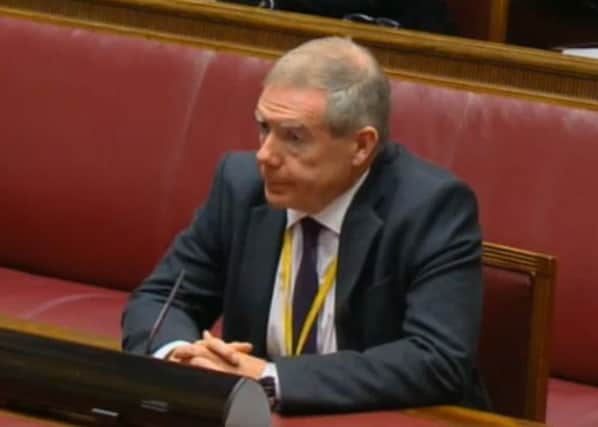RHI Inquiry: Sir Patrick Coghlin hails '˜refreshing honesty' of man who admits he didn't do enough


Today Sir Patrick Coghlin’s public inquiry revealed how Invest NI commissioned reports for companies thinking of installing biomass boilers.
Many of those reports were written by energy expert Alastair Nicoll who yesterday told the inquiry how he had repeatedly attempted to draw attention to what was going on – even contacting the GB energy regulator Ofgem, which was running the scheme for Stormont.
Advertisement
Hide AdAdvertisement
Hide AdHis often blunt reports about the perverse ‘burn to earn’ incentive at the heart of the scheme were all seen by Invest NI officials. Yet despite Invest NI being a quango under Arlene Foster’s then Stormont department, DETI – which was responsible for RHI – the warnings were not passed on.
Invest NI technical adviser Jim Clarke told the inquiry that from autumn 2014 – a year before the scheme was reined in – he was “aware through conversations, anecdote and rumour that some unnamed RHI-accredited businesses had adopted inefficient practices to maximise RHI tariff returns”.
When asked why he didn’t raise it with DETI, he said that he was in a new job and had significant responsibilities, but later added: “To be honest about it now on reflection, that isn’t an excuse; I should have been aware of that and I should have flagged it up with the relevant people in DETI.”
He said: “The view at the time within the unit I worked for was that it was government policy ... therefore, why question government policy?”
He accepted: “That was, on reflection, wrong.”
Advertisement
Hide AdAdvertisement
Hide AdSir Patrick said “it could not have been DETI’s policy to have loopholes or flaws in a scheme that involved the wastage of public money”, which Mr Clarke accepted.
Mr Clarke said that Invest NI is an organisation which has “a culture of independence”, rather than seeing itself as more firmly integrated within government.
When asked if officials talked about the RHI issues among themselves, he said: “Yes ... we were aware of issues; we were aware of potential issues ... so we were all aware ... to be frank, everybody in our team was aware of these issues.”
He said that he discussed it with his manager, Peter Larmour, but “his opinion was it was DETI policy; so why would we question DETI policy?”
Advertisement
Hide AdAdvertisement
Hide AdIn written evidence to the inquiry, Mr Larmour said that “at no stage was I aware of any issues relating with the RHI scheme which were flagged in technical consultants’ reports which would have required discussion with my line manager”. But Mr Clarke said: “I was aware, and I told him, and he knew.”
Such was the knowledge within Invest NI of the lucrative nature of RHI, one Invest NI official referred in an email to “the cash cow called pellets”.
Inquiry panel member Dame Una O’Brien thanked Mr Clarke for how he had given evidence, saying that “it always leaves an impression when a witness comes along and honestly accepts that things could have been different and I appreciate the evidence that you’ve brought to us today”.
Sir Patrick endorsed that comment, saying that the panel had to ask “the most difficult and the most searching questions” on behalf of the public, whose money had paid for the scheme.
Advertisement
Hide AdAdvertisement
Hide AdHe added: “Can I just say that it is enormously refreshing to have someone like you approach the questions which we ask – which I recognise may be difficult – with an impressive degree of honesty. So thank you very much indeed for doing that.”